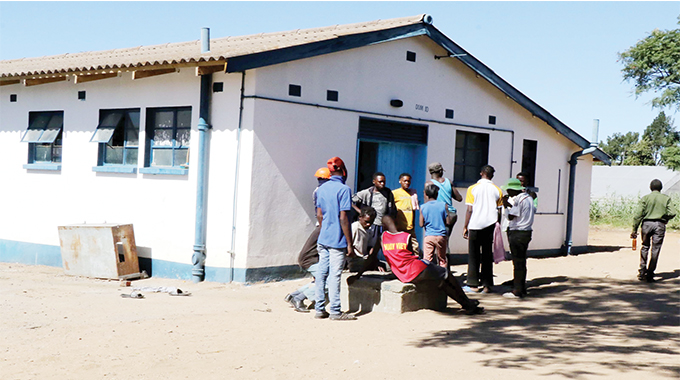Bulawayo’s street kids under lockdown

Raymond Jaravaza, Showbiz Correspondent
OBLIVIOUS of the presence of a news crew, a boy — barely 15 years old — rolls dried tobacco leaves in a piece of newspaper to make a cigarette and motions to his friend, of almost the same age, to bring a matches box.
It’s nearly 10am yesterday and a group of boys, numbering about 40 have just finished eating breakfast, consisting of rice and soup, and the 15-year-old boy can’t wait to draw smoke from his cheap cigarette.
The boys used to roam the streets of Bulawayo’s Central Business District (CBD) and are now temporarily housed at the Jairos Jiri Association centre in Nguboyenja suburb.

The teens were rounded up by officials in the Ministry of Public Service, Labour and Social Welfare in the aftermath of the coronavirus outbreak, which has claimed the lives of thousands worldwide. 0
Considered to be high risk members of society, they were taken off the streets in a bid to slow the spread of Covid-19 as the country took drastic measures such as imposing a national lockdown and enforcing social distancing to contain the novel virus.
Housed in a dormitory, situated close to the perimeter fence of the Jairos Jiri Association centre, with a couple of bunk beds, a single shower and toilet, the 40 or so boys join hundreds of Zimbabweans in quarantine facilities around the country.
The Saturday Leisure news crew is disturbed from an impromptu interview with the boy who was about to light his cigarette when commotion erupts from the other side of the dormitory. Two boys are fighting over rice.

As blows are exchanged, the rest of the group cheers the “boxers” on. It’s only when the fighting teens see an official from the Jairos Jiri Association, who has come to investigate the source of the commotion that they stop.
“They are fighting over ingoroyi (rice crust),” a much younger boy happily tells Saturday Leisure.
One of the teens that was fighting walks away to cool off and the rest of the boys gather in small groups, chatting jovially in the confines of their new living quarters, which they will call home for as long as the coronavirus continues to be a threat to society.
“We’ve been here for about a month and we eat three times a day. One of us ran away a few days after we got here, but he was caught and brought back. But the water is cold and I hate bathing with cold water,” continues the younger boy who told the news crew about the cause of the earlier fight.
For some of the boys who have been living on the streets for years and are not used to life under adult supervision and house rules in general, putting up at the Jairos Jiri Association centre in Nguboyenja seems to be taking its toll on them.

“The younger ones are happy here because they get to eat three times a day, something they are not used to in the streets, but the older boys are struggling from substance abuse withdrawal symptoms,” says *Maria, a social worker who initially tipped the Saturday Leisure about the living conditions at the centre.
“These boys are used to doing whatever they want, whenever they want, so living under any form of supervision is alien to them. Some have been abusing substances such as glue and smoking mbanje, things that they cannot get here and they are suffering from withdrawal symptoms,” she said.
A majority of the boys were rounded up around the market place on 5th Avenue, where they earned money from washing cars and begging for loose change from passersby.
Maria added that the Jairos Jiri Association is not equipped to deal with kids suffering from years of substance abuse and that the street kids are not getting any medical assistance.
The Jairos Jiri Association is a philanthropic organisation that was set up in 1950 in Bulawayo to support and train disadvantaged people.
“The street kids were just rounded up from the city centre and brought to the Jairos Jiri Association centre, without a clear plan on how issues to do with withdrawal symptoms will be dealt with,” she explained.
According to a local doctor, Matthew Matira, withdrawal symptoms are physical and mental signs that occur when an individual stops or reduces the intake of a drug or illegal substance.
“The characteristics of withdrawal symptoms depend on the type of drug or substance that is being discontinued. Symptoms may include anxiety, fatigue, sweating, vomiting, depression, seizures and sometimes hallucinations.
“It’s important for an individual suffering from withdrawal symptoms to receive supportive care as well as medication to address the symptoms and prevent further complications,” said Dr Matira.
An official at the Jairos Jiri Association centre who declined to be named, said the organisation was just offering infrastructural support to the Ministry of Public Service, Labour and Social Welfare.
“Please speak to Mr Dzoma (Fanwell), the responsible person from the Ministry of Social Welfare, he will give you all the information that you need pertaining to these kids,” said the official.
Dzoma said he was not at liberty to speak to the media and would need clearance from his superiors to do so.
Efforts to get a comment from Professor Paul Mavima, Minister of Public Service, Labour and Social Welfare were unsuccessful.
According to a report from the ministry published in 2017 states that Zimbabwe has an estimated 4 701 children living and working on the streets of the country’s major cities — Harare, Bulawayo, Gweru and Mutare among other urban centres. — @RaymondJaravaza












Comments